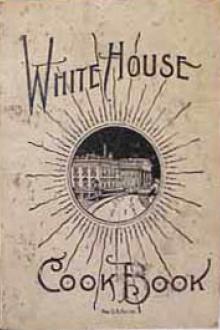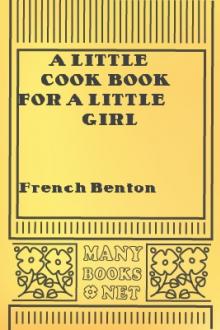The Whitehouse Cookbook (1887), Hugo Ziemann [world of reading .TXT] 📗

- Author: Hugo Ziemann
- Performer: -
Book online «The Whitehouse Cookbook (1887), Hugo Ziemann [world of reading .TXT] 📗». Author Hugo Ziemann
SPICED GRAPES.
Take the pulp from the grapes, preserving the skins. Boil the pulp and rub through a colander to get out the seeds; then add the skins to the strained pulp and boil with the sugar, vinegar and spices. To every seven pounds of grapes use four and one-half pounds of sugar, one pint of good vinegar. Spice quite highly with ground cloves and allspice, with a little cinnamon.
PICKLED CHERRIES.
Select sound, large cherries, as large as you can get them; to every quart of cherries allow a large cupful of vinegar, two tablespoonfuls of sugar, a dozen whole cloves, and half a dozen blades of mace; put the vinegar and sugar on to heat with the spices; boil five minutes, turn out into a covered stoneware vessel; cover and let it get perfectly cold; pack the cherries into jars, and pour the vinegar over them when cold; cork tightly and set away; they are fit for use almost immediately.
Vegetables of all kinds should be thoroughly picked over, throwing out all decayed or unripe parts, then well washed in several waters. Most vegetables, when peeled, are better when laid in cold water a short time before cooking. When partly cooked a little salt should be thrown into the water in which they are boiled, and they should cook steadily after they are put on, not allowed to stop boiling or simmering until they are thoroughly done. Every sort of culinary vegetable is much better when freshly gathered and cooked as soon as possible, and, when done, thoroughly drained, and served immediately while hot.
Onions, cabbage, carrots and turnips should be cooked in a great deal of water, boiled only long enough to sufficiently cook them, and immediately drained. Longer boiling makes them insipid in taste, and with too little water they turn a dark color.
Potatoes rank first in importance in the vegetable line, and consequently should be properly served. It requires some little intelligence to cook even so simple and common a dish as boiled potatoes. In the first place, all defective or green ones should be cast out; a bad one will flavor a whole dish. If they are not uniform in size, they should be made so by cutting after they are peeled. The best part of a potato, or the most nutritious, is next to the skin, therefore they should be pared very thinly, if at all; then, if old, the cores should be cut out, thrown into cold water salted a little, and boiled until soft enough for a fork to pierce through easily; drain immediately, and replace the kettle on the fire with the cover partly removed, until they are completely dried. New potatoes should be put into boiling water, and when partly done salted a little. They should be prepared just in time for cooking by scraping off the thin outside skin. They require about twenty minutes to boil.
TO BOIL NEW POTATOES.
Do not have the potatoes dug long before they are dressed, as they are never good when they have been out of the ground for some time. Well wash them, rub off the skins with a coarse cloth, and put them in boiling water salted. Let them boil until tender; try them with a fork, and when done pour the water away from them; let them stand by the side of the fire with the lid of the saucepan partly removed, and when the potatoes are thoroughly dry, put them in a hot vegetable dish, with a piece of butter the size of a walnut; pile the potatoes over this and serve. If the potatoes are too old to have the skins rubbed off; boil them in their jackets; drain, peel and serve them as above, with a piece of butter placed in the midst of them. They require twenty to thirty minutes to cook. Serve them hot and plain, or with melted butter over them.
MASHED POTATOES.
Take the quantity needed, pare off the skins and lay them in cold water half an hour; then put them into a saucepan with a little salt; cover with water and boil them until done. Drain off the water and mash them fine with a potato masher. Have ready a piece of butter the size of an egg, melted in half a cup of boiling hot milk and a good pinch of salt; mix it well with the mashed potatoes until they are a smooth paste, taking care that they are not too wet. Put them into a vegetable dish, heaping them up and smooth over the top, put a small piece of butter on the top in the centre, and have dots of pepper here and there on the surface as large as a half dime.
Some prefer using a heavy fork or wire beater, instead of a potato masher, beating the potatoes quite light and heaping them up in the dish without smoothing over the top.
BROWNED POTATOES.
Mash them the same as the above, put them into a dish that they are to be served in, smooth over the top and brush over with the yolk of an egg, or spread on a bountiful supply of butter and dust well with flour. Set in the oven to brown; it will brown in fifteen minutes with a quick fire.
MASHED POTATOES. (Warmed Over.)
To two cupfuls of cold mashed potatoes add a half cupful of milk, a pinch of salt, a tablespoonful of butter, two tablespoonfuls of flour and two eggs beaten to a froth. Mix the whole until thoroughly light; then put into a pudding or vegetable dish, spread a little butter over the top and bake a golden brown. The quality depends upon very thoroughly beating the eggs before adding them, so that the potato will remain light and porous after baking, similar to sponge cake.
POTATO PUFFS.
Prepare the potatoes as directed for mashed potato. While hot, shape in balls about the size of an egg. Have a tin sheet well buttered, and place the balls on it. As soon as all are done, brush over with beaten egg. Brown in the oven. When done, slip a knife under them and slide them upon a hot platter. Garnish with parsley and serve immediately.
POTATOES Á LA CRÊME.
Heat a cupful of milk; stir in a heaping tablespoonful of butter cut up in as much flour. Stir until smooth and thick; pepper and salt, and add two cupfuls of cold boiled potatoes, sliced, and a little very finely chopped parsley. Shake over the fire until the potatoes are hot all through, and pour into a deep dish.
NEW POTATOES AND CREAM.
Wash and rub new potatoes with a coarse cloth or scrubbing-brush; drop into boiling water and boil briskly until done, and no more; press a potato against the side of the kettle with a fork; if done, it will yield to a gentle pressure; in a saucepan have ready some butter and cream, hot, but not boiling, a little green parsley, pepper and salt; drain the potatoes, add the mixture, put over hot water for a minute or two, and serve.
SARATOGA CHIPS.
Peel good-sized potatoes, and slice them as evenly as possible. Drop them into ice-water; have a kettle of very hot lard, as for cakes; put a few at a time into a towel and shake, to dry the moisture out of them, and then drop them into the boiling lard. Stir them occasionally, and when of a light brown take them out with a skimmer, and they will be crisp and not greasy. Sprinkle salt over them while hot.
FRIED RAW POTATOES.
Peel half a dozen medium-sized potatoes very evenly, cut them in slices as thin as an egg-shell, and be sure to cut them from the breadth, not the length, of the potato. Put a tablespoonful each of butter and sweet lard into the frying pan, and as soon as it boils add the sliced potatoes, sprinkling over them salt and pepper to season them. Cover them with a tight-fitting lid, and let the steam partly cook them; then remove it, and let them fry a bright gold color, shaking and turning them carefully, so as to brown equally. Serve very hot.
Fried, cold cooked potatoes may be fried by the same recipe, only slice them a little thicker.
Remark.—Boiled or steamed potatoes chopped up or sliced while they are yet warm never fry so successfully as when cold.
SCALLOPED POTATOES. (Kentucky Style.)
Peel and slice raw potatoes thin, the same as for frying. Butter an earthen dish, put in a layer of potatoes, and season with salt, pepper, butter, a bit of onion chopped fine, if liked; sprinkle a little flour. Now put another layer of potatoes and the seasoning. Continue in this way till the dish is filled. Just before putting into the oven, pour a quart of hot milk over. Bake three-quarters of an hour.
Cold boiled potatoes may be cooked the same. It requires less time to bake them; they are delicious either way. If the onion is disliked it can be omitted.
STEAMED POTATOES.
This mode of cooking potatoes is now much in vogue, particularly where they are wanted on a large scale, it being so very convenient. Pare the potatoes, throw them into cold water as they are peeled, then put them in a steamer. Place the steamer over a saucepan of boiling water, and steam the potatoes from twenty to forty minutes, according to the size and sort. When the fork goes easily through them, they are done; then take them up, dish and serve very quickly.
POTATO SNOW.
Choose some mealy potatoes that will boil exceedingly white; pare them and cook them well, but not so as to be watery; drain them, and mash and season them well. Put in the saucepan in which they were dressed, so as to keep them as hot as possible; then press them through a wire sieve into the dish in which they are to be served; strew a little fine salt upon them previous to sending them to table. French cooks also add a small quantity of pounded loaf sugar while they are being mashed.
HASTY COOKED POTATOES.
Wash and peel some potatoes; cut them into slices of about a quarter of an inch in thickness; throw them into boiling salted water, and, if of good quality, they will be done in about ten minutes.
Strain off the water, put the potatoes into a hot dish, chop them slightly, add pepper, salt, and a few small pieces of fresh butter, and serve without loss of time.
FAVORITE WARMED POTATOES.
The potatoes should be boiled whole with the skins on in plenty of water, well salted, and are much better for being boiled the day before needed. Care should be taken that they are not over cooked. Strip off the skins (not pare them with a knife) and slice them nearly a quarter of an inch thick. Place them in a chopping-bowl and sprinkle over them sufficient salt and pepper to season them well; chop them all one way, then turn the chopping-bowl half way around and chop across them, cutting them into little square pieces the shape of dice. About twenty-five minutes before serving time, place on the stove a saucepan (or any suitable dish) containing a piece of butter the size of an egg; when it begins to melt and run over the bottom of the dish, put in a cup of rich sweet milk. When this boils up put in the chopped potatoes; there should be about a quart of them; stir them a little so





Comments (0)